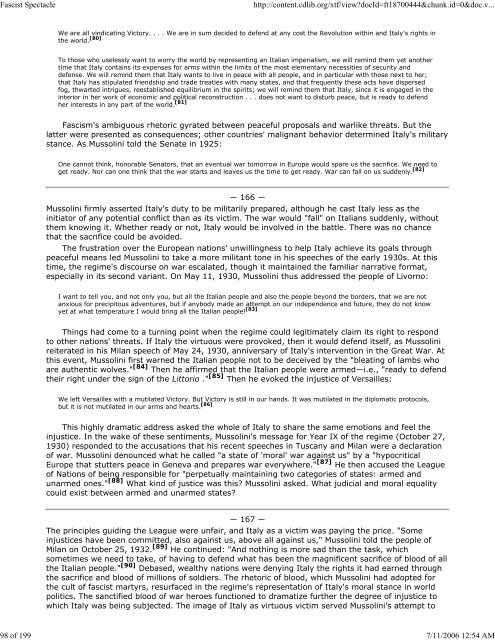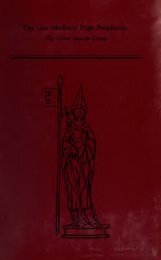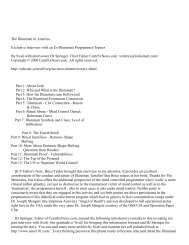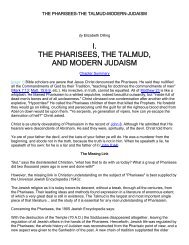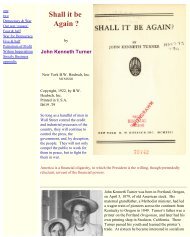You also want an ePaper? Increase the reach of your titles
YUMPU automatically turns print PDFs into web optimized ePapers that Google loves.
<strong>Fascist</strong> <strong>Spectacle</strong> http://content.cdlib.org/xtf/view?docId=ft18700444&chunk.id=0&doc.v...<br />
We are all vindicating Victory. . . . We are in sum decided to defend at any cost the Revolution within and Italy's rights in<br />
the world. [80]<br />
To those who uselessly want to worry the world by representing an Italian imperialism, we will remind them yet another<br />
time that Italy contains its expenses for arms within the limits of the most elementary necessities of security and<br />
defense. We will remind them that Italy wants to live in peace with all people, and in particular with those next to her;<br />
that Italy has stipulated friendship and trade treaties with many states, and that frequently these acts have dispersed<br />
fog, thwarted intrigues, reestablished equilibrium in the spirits; we will remind them that Italy, since it is engaged in the<br />
interior in her work of economic and political reconstruction . . . does not want to disturb peace, but is ready to defend<br />
her interests in any part of the world. [81]<br />
Fascism's ambiguous rhetoric gyrated between peaceful proposals and warlike threats. But the<br />
latter were presented as consequences; other countries' malignant behavior determined Italy's military<br />
stance. As Mussolini told the Senate in 1925:<br />
One cannot think, honorable Senators, that an eventual war tomorrow in Europe would spare us the sacrifice. We need to<br />
get ready. Nor can one think that the war starts and leaves us the time to get ready. War can fall on us suddenly. [82]<br />
― 166 ―<br />
Mussolini firmly asserted Italy's duty to be militarily prepared, although he cast Italy less as the<br />
initiator of any potential conflict than as its victim. The war would "fall" on Italians suddenly, without<br />
them knowing it. Whether ready or not, Italy would be involved in the battle. There was no chance<br />
that the sacrifice could be avoided.<br />
The frustration over the European nations' unwillingness to help Italy achieve its goals through<br />
peaceful means led Mussolini to take a more militant tone in his speeches of the early 1930s. At this<br />
time, the regime's discourse on war escalated, though it maintained the familiar narrative format,<br />
especially in its second variant. On May 11, 1930, Mussolini thus addressed the people of Livorno:<br />
I want to tell you, and not only you, but all the Italian people and also the people beyond the borders, that we are not<br />
anxious for precipitous adventures, but if anybody made an attempt on our independence and future, they do not know<br />
yet at what temperature I would bring all the Italian people! [83]<br />
Things had come to a turning point when the regime could legitimately claim its right to respond<br />
to other nations' threats. If Italy the virtuous were provoked, then it would defend itself, as Mussolini<br />
reiterated in his Milan speech of May 24, 1930, anniversary of Italy's intervention in the Great War. At<br />
this event, Mussolini first warned the Italian people not to be deceived by the "bleating of lambs who<br />
are authentic wolves." [84] Then he affirmed that the Italian people were armed—i.e., "ready to defend<br />
their right under the sign of the Littorio ." [85] Then he evoked the injustice of Versailles:<br />
We left Versailles with a mutilated Victory. But Victory is still in our hands. It was mutilated in the diplomatic protocols,<br />
but it is not mutilated in our arms and hearts. [86]<br />
This highly dramatic address asked the whole of Italy to share the same emotions and feel the<br />
injustice. In the wake of these sentiments, Mussolini's message for Year IX of the regime (October 27,<br />
1930) responded to the accusations that his recent speeches in Tuscany and Milan were a declaration<br />
of war. Mussolini denounced what he called "a state of 'moral' war against us" by a "hypocritical<br />
Europe that stutters peace in Geneva and prepares war everywhere." [87] He then accused the League<br />
of Nations of being responsible for "perpetually maintaining two categories of states: armed and<br />
unarmed ones." [88] What kind of justice was this? Mussolini asked. What judicial and moral equality<br />
could exist between armed and unarmed states?<br />
― 167 ―<br />
The principles guiding the League were unfair, and Italy as a victim was paying the price. "Some<br />
injustices have been committed, also against us, above all against us," Mussolini told the people of<br />
Milan on October 25, 1932. [89] He continued: "And nothing is more sad than the task, which<br />
sometimes we need to take, of having to defend what has been the magnificent sacrifice of blood of all<br />
the Italian people." [90] Debased, wealthy nations were denying Italy the rights it had earned through<br />
the sacrifice and blood of millions of soldiers. The rhetoric of blood, which Mussolini had adopted for<br />
the cult of fascist martyrs, resurfaced in the regime's representation of Italy's moral stance in world<br />
politics. The sanctified blood of war heroes functioned to dramatize further the degree of injustice to<br />
which Italy was being subjected. The image of Italy as virtuous victim served Mussolini's attempt to<br />
98 of 199 7/11/2006 12:54 AM


